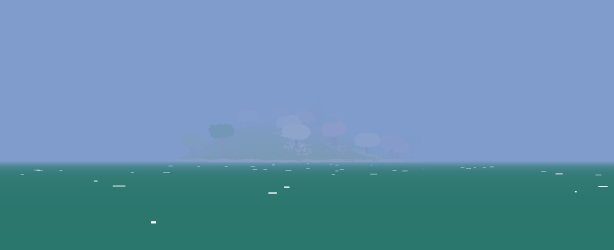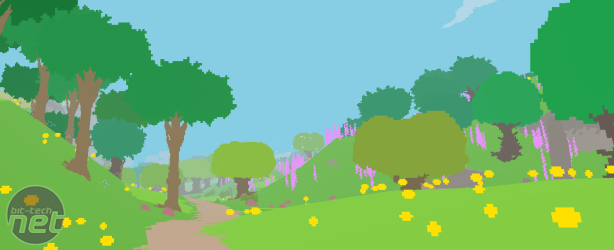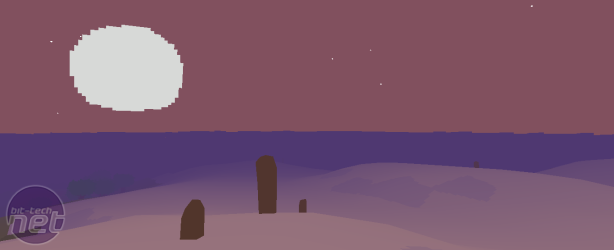
Proteus Review
Developer: Curve StudiosDesigner: Ed Key
Composer: David Kanga
Platform(s): Linux, Mac OS, Microsoft Windows, PlayStation 3, PlayStation Vita
Price: £6.99
Proteus, by Ed Key and David Kanaga, starts like this. You, whatever you are (the game never clarifies whether you're human or not) are floating in the ocean. In the distance you can make out a small island – trees, hills, a beach – and above it, the sun. After looking around to see if there's sign of land anywhere else, and finding that there isn't, you instinctively start to walk towards the island, either by pushing forward on the left analogue stick or, if you're playing the original Windows version, holding down the W key. When you arrive on land, you're greeted by a beautiful, springtime vista, rendered in a distinct, pixellated style.
The trees are green, the sky is blue and all around are furry little critters that make chirpy musical noises every time they hop. As you walk onwards, you discover in fact that everything makes a sound. When you walk past the rocks, they make a low, bass-heavy hum. When you look at the flowers, they tingle and chatter like a wind chime. Even staring at the sun creates a sound, this irritating, high pitched beep. The island becomes almost like an instrument, which you “play” by walking around and looking at different objects. And once you hit the right sequence of notes – once you visit the right parts of the island and activate them in a certain way – time accelerates and you're transported to another part of Proteus during a different season. The game starts in spring and ends in winter and each different time and place gives you new things to see and new things to hear.
There is an ending, of sorts, but Proteus is about the journey, about walking slowly around, contemplating all there is to look at and listen to. It's beautiful and calm, and an almost unique example of a videogame where you're allowed to just dawdle rather than rush off to complete an objective.
But I'm reticent to write it up that way. If I had to attach some adjectives to it, or a pull quote to be used on the games' poster, I'd call Proteus “meditative” and “relaxing” - I'd say it was “the perfect game to unwind with after a hard day at work.”
But I think it's much more than that. Yes, Proteus is a game that's nice to listen to, but it's also intelligent, dignified and serious in a way that few videogames are.
It expects you to be patient. Without showering you in feedback and rewards, it demands that you pay it attention. There's no story as such and no challenges or fail states or end of level bonuses. Instead, it's a game about taking your time. It stresses the importance of stopping to breathe in the videogame world around you, of appreciating the work and expertise that has gone into its creation. As a new type of storytelling in games starts to emerge, one that relies on exploration and engagement, that's an important virtue for players to have.
Look at say BioShock. There's a game which, for the most part, substitutes cutscenes and dialogue for a kind of interactive narrative. You learn about the fall of Rapture by looking at posters on the wall, or discovering little micro-setups, like the bodies of the parents who poisoned their two kids. It's artefacts like these – little details sprinkled around videogame environments – that are increasingly being used to tell stories in games. And if you want to find them, you have to have the patience to look around and explore. Gone Home is a good recent example. If you rush through, and don't take time to check out the world, you won't understand the game.

MSI MPG Velox 100R Chassis Review
October 14 2021 | 15:04












Want to comment? Please log in.